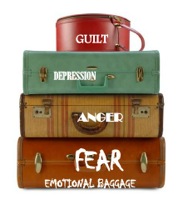Difference between revisions of "Baggage"
m (Text replacement - "http://" to "https://") |
|||
| (One intermediate revision by the same user not shown) | |||
| Line 2: | Line 2: | ||
==Origin== | ==Origin== | ||
| − | [ | + | [https://nordan.daynal.org/wiki/index.php?title=English#ca._1100-1500_.09THE_MIDDLE_ENGLISH_PERIOD Middle English] ''bagage'', from Middle French, from ''bagues'' belongings, baggage |
| − | *[ | + | *[https://en.wikipedia.org/wiki/15th_century 15th Century] |
''Luggage'' - 1596, from lug (v.) "to drag;" so, lit. "what has to be lugged about" (or, in Johnson's definition, "any thing of more bulk than [[value]]"). In 20c., the usual [[word]] for "baggage belonging to passengers." | ''Luggage'' - 1596, from lug (v.) "to drag;" so, lit. "what has to be lugged about" (or, in Johnson's definition, "any thing of more bulk than [[value]]"). In 20c., the usual [[word]] for "baggage belonging to passengers." | ||
| Line 18: | Line 18: | ||
Luggage is more or less the same concept as "baggage", but is [[normally]] used in relation to the personal baggage of a specific person or persons (e.g. I have lost my luggage, he has [[prepared]] his luggage, but not normally I have lost my baggage, he has prepared his baggage). The [[modern]] traveler can be [[expected]] to have packages containing clothing, toiletries, small possessions, trip necessities, and on the return-trip, [[souvenir]]s. For some, luggage and the [[style]] thereof is [[representative]] of the owner's [[wealth]]. | Luggage is more or less the same concept as "baggage", but is [[normally]] used in relation to the personal baggage of a specific person or persons (e.g. I have lost my luggage, he has [[prepared]] his luggage, but not normally I have lost my baggage, he has prepared his baggage). The [[modern]] traveler can be [[expected]] to have packages containing clothing, toiletries, small possessions, trip necessities, and on the return-trip, [[souvenir]]s. For some, luggage and the [[style]] thereof is [[representative]] of the owner's [[wealth]]. | ||
| − | Baggage (not luggage), or baggage train, can also refer to the train of people and [[goods]], both [[military]] and of a [[personal]] nature, which commonly followed pre-modern armies on [[campaign]].[ | + | Baggage (not luggage), or baggage train, can also refer to the train of people and [[goods]], both [[military]] and of a [[personal]] nature, which commonly followed pre-modern armies on [[campaign]].[https://en.wikipedia.org/wiki/Baggage] |
[[Category: General Reference]] | [[Category: General Reference]] | ||
Latest revision as of 23:45, 12 December 2020
Origin
Middle English bagage, from Middle French, from bagues belongings, baggage
Luggage - 1596, from lug (v.) "to drag;" so, lit. "what has to be lugged about" (or, in Johnson's definition, "any thing of more bulk than value"). In 20c., the usual word for "baggage belonging to passengers."
According to the Oxford English Dictionary, the word luggage enters printed English in 1596. The word derived from the verb "lug," as in "that which needs to be lugged about." The idea of pulling things inherent in the verb lug combines with the suffix -age to create the word we know today.
"Baggage" is a similar word with the same suffix. This common word ending (-age) means that the item is functionally related to the root word; hence "baggage" is functionally related to the noun "bag," and luggage related to the act of "lugging."
Definitions
- 1: suitcases, trunks, and personal belongings of travelers : luggage
- 2: transportable equipment especially of a military force
- 3: intangible things (as feelings, circumstances, or beliefs) that get in the way <emotional baggage>
Description
Baggage is any number of bags, cases and containers which hold a traveler's articles during transit.
Luggage is more or less the same concept as "baggage", but is normally used in relation to the personal baggage of a specific person or persons (e.g. I have lost my luggage, he has prepared his luggage, but not normally I have lost my baggage, he has prepared his baggage). The modern traveler can be expected to have packages containing clothing, toiletries, small possessions, trip necessities, and on the return-trip, souvenirs. For some, luggage and the style thereof is representative of the owner's wealth.
Baggage (not luggage), or baggage train, can also refer to the train of people and goods, both military and of a personal nature, which commonly followed pre-modern armies on campaign.[1]
